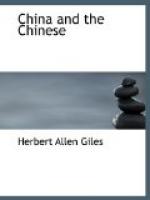Fusang, account of, in Chinese book, 58.
Games, Chinese, similarity to Grecian, 126.
Geography, Chinese, Cambridge collection, 57.
Girls—
Education, 197.
Foot-binding, see that
title.
Market value, 195.
[See also Women]
Glasses, see Eyeglasses.
“God,” analysis of Chinese written character, 33.
Government—
Circuits, 76, 83.
“Crying one’s
wrongs,” 101-103.
Dynasties, see that title.
Emperors, see that title.
Headboroughs, 77-78.
Justice, see that title.
Magistrates, see that title.
Mandarins, see that title.
Mencius, quotations from,
84-87.
Ming dynasty, see that
title.
Official positions, see
that title.
Penal Code, 56, 87-88.
Prefectures, 76, 83.
Provincial government, see
that title.
Scale of governors, 78.
Self-government illustrations,
96-106.
Viceroys, 76, 82, 83.
Governors of provinces, 76, 83.
Grain commissioner, provincial official, 81.
Granville, Lord, influence of the classics on, 112.
Grammar, Chinese, absence of, 10.
Grape-wine introduced into China, 131.
Great Learning, Confucian Canon, 42.
Greece, ancient Greece and China—
Archaeology, Greek and Chinese,
120.
Bactria, see that title.
Buddhist priest anecdote in
Chinese jest-book, 188.
Calendars, 129.
City sights in China, 123-124.
Classics, relative values
of Chinese and Greek training, 109-119.
Coincidences between Chinese
and Greek civilisations, 120-139.
Counting-board, 128.
Entertainments, 126-127.
Games, 126.
“Heavenly horse,”
131, 133.
House, Chinese, Greek characteristics,
120-131.
Ivory carvings, 124-125.
Language, terms of abuse,
124.
Literatures of China and western
nations, analogies, 135-139.
Marriage, similar customs,
122.
Mirrors, 132-133.
Music, 129.
Olives, 128.
Plays, 125-126.
Quails, fighting, 126.
Question of Greek influence,
130-133.
Water-clock, 128.
Wine-drinking, 126-127.
Women, points of resemblance,
121-122.
Words, Chinese, Greek origin,
133-135.
“Guess-fingers,” game of, common to Greece and China, 126.
Guests, see Visitors.
Hair—
Black-haired People, title
of Chinese, 181.
Dyeing, 180.
False hair, 180.
Queue, see that title.
Han Fei Tzu, writer on Taoism, 148.
Hangchow tea strike, 95.
Hankow military riot, 1882, 97.
Han Yue, statesman, great works of, 117.




